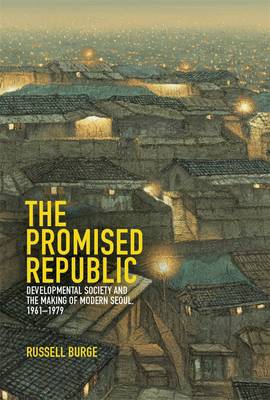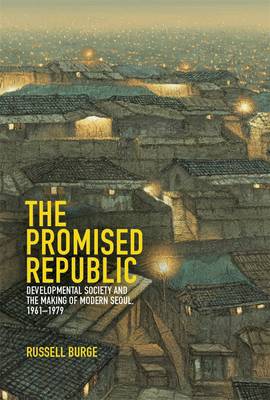
- Afhalen na 1 uur in een winkel met voorraad
- Gratis thuislevering in België vanaf € 30
- Ruim aanbod met 7 miljoen producten
- Afhalen na 1 uur in een winkel met voorraad
- Gratis thuislevering in België vanaf € 30
- Ruim aanbod met 7 miljoen producten
Zoeken
€ 86,95
+ 173 punten
Omschrijving
In The Promised Republic, Russell Burge offers a bold new history of South Korea's rapid development. By focusing on the experience of rural-to-urban migrants who built and lived in Seoul's shantytowns, Burge historicizes national development as a site of struggle with the urban poor at its center. What would a society of postcolonial abundance look like? Who was this society built for, and how would access to the city that formed its economic center be claimed and defended? These were the questions at stake in the urban struggles of the 1960s and 1970s, an era when authorities found themselves caught between a mandate to create well-disciplined cities and the promise of broad uplift that legitimated their leadership. Utilizing memoirs, interviews, newspapers, journals, photographs, literature, anthropological records, and critical as well as official sources, Burge reconstructs a not-altogether-vanished world and provides historical background of conflicts over urban access and inequality that continue to enrage and resonate to this day.
Specificaties
Betrokkenen
- Auteur(s):
- Uitgeverij:
Inhoud
- Aantal bladzijden:
- 360
- Taal:
- Engels, Koreaans
- Reeks:
Eigenschappen
- Productcode (EAN):
- 9780674304819
- Verschijningsdatum:
- 2/06/2026
- Uitvoering:
- Hardcover
- Formaat:
- Genaaid
- Afmetingen:
- 152 mm x 229 mm

Alleen bij Standaard Boekhandel
+ 173 punten op je klantenkaart van Standaard Boekhandel
Beoordelingen
We publiceren alleen reviews die voldoen aan de voorwaarden voor reviews. Bekijk onze voorwaarden voor reviews.








